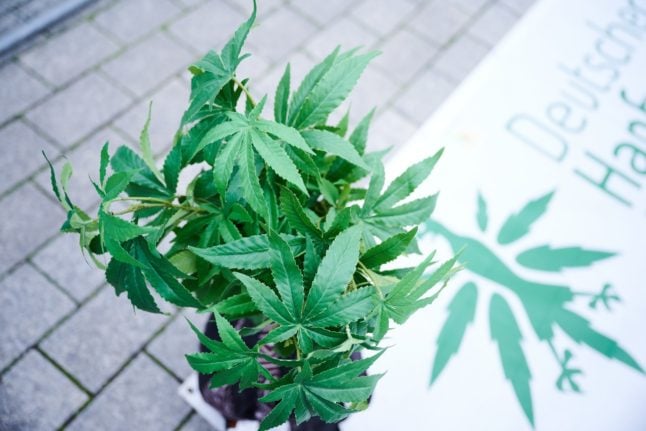EXPLAINED: How Germany's future cannabis clubs could work

Germany's plans to legalise recreational cannabis will be welcomed by many weed smokers - but with legal routes for purchasing the drug restricted to highly regulated clubs, it's not quite the free-for-all that many imagined. Here's what you need to know.
For many Europeans, hearing the words 'cannabis legalisation' conjures up images of Amsterdam-style coffee shops: special licensed weed cafes where stoners and tourists while away hours in a cloud of smoke.
This was one of the ideas on the table as Germany's coalition government set about planning its forthcoming legal cannabis market - alongside the sale of marijuana in pharmacies and other licensed shops.
But after experiencing legal hurdles - not least of all from the EU's Narcotics Act - the Health Ministry last month put together a significantly watered down version of the plans.
Significantly, growing a small amount of cannabis at home, consuming the drug or carrying a certain amount of it while out in public will no longer be criminalised.
But people who want to purchase or sell marijuana through legal channels with have some significant hurdles to jump through.
According to a new draft law obtained by DPA, the government wants cannabis to be bought and sold at special licensed clubs that are subject to strict regulations - and there will also be stringent rules on when and where the drug can be consumed in public.
Here's an overview of what's in the draft so far - though it could be amended at a later date.
Members-only clubs
When the plans to legalise cannabis were described in the original coalition agreement, the SPD, Greens and FDP envisioned the sale of weed in "licensed shops" that you might encounter around the city.
Instead, the Health Ministry now wants to allow people to set up "cultivation associations" that grow and sell cannabis to members. This is very similar to a model established in Malta, where non-profit collectives set up their own mini weed farms and sell their products at a low price to members.
In Germany, membership will be restricted to people over the age of 18 and no more than 500 members per club. There will also be rules stating that individuals cannot be members of more than one club at a time, and that the associations can only sell cannabis to members.
If you gain membership of one of these clubs, though, you'll still have some restrictions around purchasing cannabis. According to the draft, each member will be able to purchase a maximum of 50g of cannabis per month, which will be sold in plain packaging or no packaging at all.
A leaflet detailing the weight, harvest date, best before date, variety and active ingredient content (THC and CBD) should also be provided whenever the drug is sold.
READ ALSO: EXPLAINED: What you need to know about Germany's plan to legalise cannabis
No smoking on the premises
Though the term 'club' may suggest a social environment, Germany's members-only clubs are unlikely to turn into gathering spots for people who enjoy weed.
That's because, according to the draft, people won't be allowed to smoke on the premises - or within 250 metres of it.
According to the government, this membership system will be the first phase in a two-phase process of piloting the legalisation of weed. As a next phase, a small number of licensed shops could be set up in certain local districts in order to test how this could impact society and potentially help combat the black market.

A protester smokes a joint during a cannabis legalisation demo in Berlin. Photo: picture alliance/dpa | Annette Riedl
Reporting to authorities
For owners of cannabis cultivation clubs, there'll be a fair amount of paperwork to contend with. For example, the clubs will have to submit annual reports to the authorities revealing how much cannabis was produced, what quantity of active ingredients (i.e. compounds that produce a 'high'), how much of their stock they dispensed with or destroyed in the past year and what their current stock levels are.
In addition, according to the draft, the clubs must continuously document where they obtain seeds, how many plants they grow and seeds they store and the amount of cannabis purchased by individual members.
They must also ensure that limits for pesticide and fertiliser residues are complied with.
Child protection laws
Clubs will also have to navigate strict rules designed to protect children and young adults. As well as restricting membership to over-18s, there will be a special category of membership for youths aged 18-21.
This group will only be allowed to purchase up to 30g of cannabis per month, with a maximum THC content of 10 percent. THC is the active ingredient that produces psychedelic effects, while CBD is the ingredient that causes smokers to feel relaxed and mellow.
Areas of the club where cannabis is stored and grown will need to be sealed off to the public, with heightened security measures to prevent break-ins and theft. According to reports by DPA, the draft also stipulates that minimum distances to places like schools and nurseries will have to be maintained.
In addition, club owners will need to draw up a youth and health protection concept and appoint a fully trained addiction prevention officer.
READ ALSO: UPDATE: German ministers present draft law on cannabis legislation

A hemp plant made out of plastic is displayed as part of a demonstration calling for the legislation of cannabis. Photo: picture alliance/dpa | Annette Riedl
Restrictions on smoking in public
Alongside strict rules around purchasing and selling cannabis at the members' clubs, the draft also sets out some restrictions on smoking weed in public.
People wanting to smoke outdoors will need to think carefully about where they do it, as they'll need to keep a distance of at least 250 metres from schools, day-care centres, playgrounds, youth facilities or sports facilities.
Smoking in "pedestrian zones" will also be banned between 7am and 8pm, so people who want to light up a joint in these areas will need restrict their smoking time to the evenings.
Growing and carrying cannabis
Despite the tough rules around buying (and consuming) marijuana, the legislation still marks a sea change in the legal system's approach to the drug.
If the law passes without significant changes, people will in future be able to grow up to three of their own cannabis plants for personal use and won't get in trouble with the police if they're found carrying up to 25g in public.
What are the next steps?
Health Minister Karl Lauterbach (SPD) apparently circulated his draft law around various government ministries at the end of April.
Once this review process is done and the draft has been finalised, a consultation process begins in which the government talks to relevant experts and stakeholders. This is expected to happen this month.
After this - likely in June - the draft will voted on by the cabinet ministers. Once this hurdle is cleared, the plans can go to the Bundestag for a debate. However, the Health Ministry says it will not be required to be put to a vote.
At some point in summer, Germany's Constitution Court is also expected to make a decision on whether the law complies with the country's Basic Law. Depending on the outcome, the law may have to be amended again.
Currently, the government is hoping to kick off the licensing process by the end of the year, with clubs potentially opening their doors in 2024.
Comments
See Also
For many Europeans, hearing the words 'cannabis legalisation' conjures up images of Amsterdam-style coffee shops: special licensed weed cafes where stoners and tourists while away hours in a cloud of smoke.
This was one of the ideas on the table as Germany's coalition government set about planning its forthcoming legal cannabis market - alongside the sale of marijuana in pharmacies and other licensed shops.
But after experiencing legal hurdles - not least of all from the EU's Narcotics Act - the Health Ministry last month put together a significantly watered down version of the plans.
Significantly, growing a small amount of cannabis at home, consuming the drug or carrying a certain amount of it while out in public will no longer be criminalised.
But people who want to purchase or sell marijuana through legal channels with have some significant hurdles to jump through.
According to a new draft law obtained by DPA, the government wants cannabis to be bought and sold at special licensed clubs that are subject to strict regulations - and there will also be stringent rules on when and where the drug can be consumed in public.
Here's an overview of what's in the draft so far - though it could be amended at a later date.
Members-only clubs
When the plans to legalise cannabis were described in the original coalition agreement, the SPD, Greens and FDP envisioned the sale of weed in "licensed shops" that you might encounter around the city.
Instead, the Health Ministry now wants to allow people to set up "cultivation associations" that grow and sell cannabis to members. This is very similar to a model established in Malta, where non-profit collectives set up their own mini weed farms and sell their products at a low price to members.
In Germany, membership will be restricted to people over the age of 18 and no more than 500 members per club. There will also be rules stating that individuals cannot be members of more than one club at a time, and that the associations can only sell cannabis to members.
If you gain membership of one of these clubs, though, you'll still have some restrictions around purchasing cannabis. According to the draft, each member will be able to purchase a maximum of 50g of cannabis per month, which will be sold in plain packaging or no packaging at all.
A leaflet detailing the weight, harvest date, best before date, variety and active ingredient content (THC and CBD) should also be provided whenever the drug is sold.
READ ALSO: EXPLAINED: What you need to know about Germany's plan to legalise cannabis
No smoking on the premises
Though the term 'club' may suggest a social environment, Germany's members-only clubs are unlikely to turn into gathering spots for people who enjoy weed.
That's because, according to the draft, people won't be allowed to smoke on the premises - or within 250 metres of it.
According to the government, this membership system will be the first phase in a two-phase process of piloting the legalisation of weed. As a next phase, a small number of licensed shops could be set up in certain local districts in order to test how this could impact society and potentially help combat the black market.

Reporting to authorities
For owners of cannabis cultivation clubs, there'll be a fair amount of paperwork to contend with. For example, the clubs will have to submit annual reports to the authorities revealing how much cannabis was produced, what quantity of active ingredients (i.e. compounds that produce a 'high'), how much of their stock they dispensed with or destroyed in the past year and what their current stock levels are.
In addition, according to the draft, the clubs must continuously document where they obtain seeds, how many plants they grow and seeds they store and the amount of cannabis purchased by individual members.
They must also ensure that limits for pesticide and fertiliser residues are complied with.
Child protection laws
Clubs will also have to navigate strict rules designed to protect children and young adults. As well as restricting membership to over-18s, there will be a special category of membership for youths aged 18-21.
This group will only be allowed to purchase up to 30g of cannabis per month, with a maximum THC content of 10 percent. THC is the active ingredient that produces psychedelic effects, while CBD is the ingredient that causes smokers to feel relaxed and mellow.
Areas of the club where cannabis is stored and grown will need to be sealed off to the public, with heightened security measures to prevent break-ins and theft. According to reports by DPA, the draft also stipulates that minimum distances to places like schools and nurseries will have to be maintained.
In addition, club owners will need to draw up a youth and health protection concept and appoint a fully trained addiction prevention officer.
READ ALSO: UPDATE: German ministers present draft law on cannabis legislation

Restrictions on smoking in public
Alongside strict rules around purchasing and selling cannabis at the members' clubs, the draft also sets out some restrictions on smoking weed in public.
People wanting to smoke outdoors will need to think carefully about where they do it, as they'll need to keep a distance of at least 250 metres from schools, day-care centres, playgrounds, youth facilities or sports facilities.
Smoking in "pedestrian zones" will also be banned between 7am and 8pm, so people who want to light up a joint in these areas will need restrict their smoking time to the evenings.
Growing and carrying cannabis
Despite the tough rules around buying (and consuming) marijuana, the legislation still marks a sea change in the legal system's approach to the drug.
If the law passes without significant changes, people will in future be able to grow up to three of their own cannabis plants for personal use and won't get in trouble with the police if they're found carrying up to 25g in public.
What are the next steps?
Health Minister Karl Lauterbach (SPD) apparently circulated his draft law around various government ministries at the end of April.
Once this review process is done and the draft has been finalised, a consultation process begins in which the government talks to relevant experts and stakeholders. This is expected to happen this month.
After this - likely in June - the draft will voted on by the cabinet ministers. Once this hurdle is cleared, the plans can go to the Bundestag for a debate. However, the Health Ministry says it will not be required to be put to a vote.
At some point in summer, Germany's Constitution Court is also expected to make a decision on whether the law complies with the country's Basic Law. Depending on the outcome, the law may have to be amended again.
Currently, the government is hoping to kick off the licensing process by the end of the year, with clubs potentially opening their doors in 2024.
Join the conversation in our comments section below. Share your own views and experience and if you have a question or suggestion for our journalists then email us at [email protected].
Please keep comments civil, constructive and on topic – and make sure to read our terms of use before getting involved.
Please log in here to leave a comment.